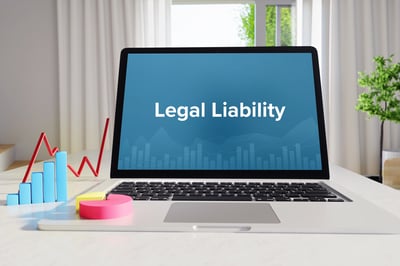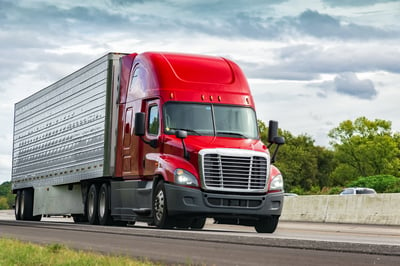
Top 5 Risk Mitigation Factors Freight Brokers & 3PLs Provide Shippers
November 12, 2020 •Rick LaGore
Truckload• Intermodal Transportation• Logistics & Supply Chain• LTL• Freight Broker• Logistics Service Provider

Believe it or not, a third party logistics company / freight broker helps companies minimize a shipper’s risk when sourcing freight through their operations.
Quite often we read the negatives of a freight broker and how they are just a middle person in the freight transaction trying to make a buck, but contrary to these negative articles they do bring many benefits to a company’s freight and logistics buys whether the logistics service provider (LSP) is operating as a broker or a third party logistics company under their fully outsourced freight management service solution.
We understand and appreciate the skepticism on the topic, but if you hear us out over the next few minutes you’ll understand why this is one of the many items the co-founders of InTek Freight & Logistics flipped on when they moved from being a shipper themselves over 20 years ago to starting a logistics service provider.
The Factors of Risk Mitigation
Paying too Much for Your Freight Shipments
 The first of the mitigation risks is the risk of paying too much for your freight.
The first of the mitigation risks is the risk of paying too much for your freight.
Logistics providers tap into the full freight market in an efficient manner because of their unique position in the industry and because out of need to be successful for its customers and profitable for its bank. Through its systems, processes and relationships a logistics company is able to leverage the full motor carrier market for the best price possible.
This is possible even as they sit in the middle of the transaction needing a profit themselves because of the efficiencies it has built into its business model to tap into the highly fragmented trucking industry. According to the US Department of Transportation, the motor truckload market is a $700 billion dollar business with over 700,000 motor carrier companies, with 91.0% operating 6 or fewer trucks and 97.3% operating fewer than 20 trucks.
Shippers do not have the systems, time and process to ensure they can access the entire market both economically and safely, with the latter meaning putting their freight on reliable, safe and insured asset carriers which is critical to avoiding tens of millions of dollar liability suits.
The shippers transportation management systems (TMS) need a rate and routing established with contracted carriers to drive their efficiencies and fill rates their customers require, which keeps their logistics spend focused internally.
Legal Liability Mitigation - Insurance & Safety Rating Validation
 As was touched on previously, it is critical that firms place their freight on safe carriers, as defined and tracked by the FMCSA (Federal Motor Carrier Safety Administration).
As was touched on previously, it is critical that firms place their freight on safe carriers, as defined and tracked by the FMCSA (Federal Motor Carrier Safety Administration).
Non-asset freight providers make a living performing this task thousands of times a month. Their systems reach out to the market quickly to find capacity and immediately validate the motor carrier’s insurance, FMCSA safety and operating ratings to ensure they are working with a legal carrier that is without issues.
In addition to the frontend check freight brokers have before booking their freight, their TMS systems also alert the Operations Management Team if a carrier’s rating changes on any freight that is loaded and in-transit.
While there are shippers that perform the safety rating and insurance check on their carriers, the vast majority of shippers do not, yet it is critical with the courts step in mitigating a shippers liability if their freight is on board a motor carrier that is involved in a fatal accident.
These rulings have become so prevalent that they have their own term, “nuclear rulings.” The result of these rulings is multi-million dollar payments and in some cases cause companies to shut their doors forever.
Cargo Liability Mitigation
 In addition to legal liability coverage, logistics providers layer in an additional layer of cargo insurance coverage through their contingency cargo or shipper’s interest coverage.
In addition to legal liability coverage, logistics providers layer in an additional layer of cargo insurance coverage through their contingency cargo or shipper’s interest coverage.
A freight broker’s contingency cargo is a policy, most logistics companies carry. The policy is written in a way that it will cover the lesser of $250,000 or the cargo insurance coverage of the underlying motor carrier used for the shipper’s particular freight load.
Contingency cargo insurance is insurance held by freight brokers to cover gaps that may present itself in the underlying motor carrier's insurance at the time the damage or loss occurred.
The “contingent” implies the insurance only goes into effect if and when the motor carrier used on the load fails to cover the damage or loss sustained on the shipment. Factors that may fail in a motor carrier's shipper interest cargo liability coverage include: policy cancellation, loss or damage exclusions, refusal to cover, etc.
Mitigate Capacity Shortages
 Shippers mitigate their capacity shortages by having at least one freight broker in the logistics execution strategy.
Shippers mitigate their capacity shortages by having at least one freight broker in the logistics execution strategy.
As mentioned earlier, freight logistics providers have systems, processes, people and market relationships that allow them to effectively and efficiently tap into the freight market for capacity to provide a shipper with a truck and rate to keep their freight moving.
Shippers not having this outlet find themselves often spinning their wheels and spending countless hours tapping into their rolodex of freights sales people cards dropped by their office looking for business the past six months. Add to this time drain, pushing freight into the unknown brings liability risks and higher freight rates.
Open Source of Freight Knowledge
 The last area logistics companies mitigate risks and costs for a shipper is being the sounding board and “free” resource to help with various situations that they would be spending more than they should or tapping into legal counsel much sooner than is required.
The last area logistics companies mitigate risks and costs for a shipper is being the sounding board and “free” resource to help with various situations that they would be spending more than they should or tapping into legal counsel much sooner than is required.
Examples include:
- My purchasing department just put through a shipment on “XYZ Carrier”. We do not have a relationship with the carrier, so they are charging us base rates. Is there a way you can slide it under you LTL tariff to save us the 65% we probably are overpaying.
- My legal team has question “ABC” on how to handle a claim with a particular carrier and / or customer. What would you suggest us to do in this situation?
- We are having a lot of claims on some of our freight. Would you be able to review the situation and advise what can be done to improve the claims rate?
The examples go on-and-on, but this gives you a flavor that a strong logistics partnership can bring to the table to mitigate costs and risks. The suggestion would be to employ a mid-tier logistics company because if working with one of the larger groups, you’ll not have the connections to the higher levels that would be able to address all your questions in this area.
Final Thoughts on Freight Broker / Logistics Providers Mitigating Risk for a Shipper
So, after further review freight brokers / logistics service providers bring more to the table than just a truck and a rate. As outlined above, the non-asset freight provider mitigates service, price and risk at various levels of the relationship.
For more questions and answers associated with logistics and supply chain challenges we invite you to our Freight Guides.
If you find yourself looking for another freight provider option, we'd love to be part of the conversation so please do not hesitate to reach out and contact us.
Some of our most read content includes:
- The Comprehensive Guide on Managed Transportation Services
- Best Managed Transportation Companies (And How to Choose)
- Top 20 Freight Brokerage Companies (& How to Choose The Best)
- The Complete Guide to Freight Management Service Solutions
- How Much Does Managed Transportation Cost? A Comprehensive Guide
- Freight Costs: An Insider’s Look on Freight Pricing Buyers Should Know
Get Updates
Featured Articles
Categories
- Freight & Shipping Costs (54)
- Freight Broker (60)
- Freight Forwarder (2)
- Intermodal Transportation (184)
- International & Cross Border Logistics (43)
- Logistics & Supply Chain (420)
- Logistics Service Provider (77)
- LTL (39)
- Managed TMS (49)
- News (39)
- Supply Chain Sustainability (12)
- Transportation Management System (37)
- Truckload (122)
- Warehousing & Distribution (50)


